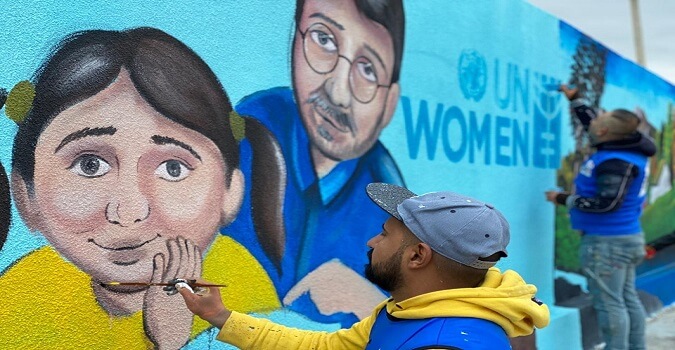Past initiatives

The lockdown and movement restriction caused by the COVID-19 pandemic caused a surge in domestic violence in Iraq. As a result, UN Women led advocacy work for the enactment of the Iraqi Anti-Domestic Violence Law, along with other UN agencies and international actors. At the community level, UN Women provided support to survivors through shelters and mobile teams. Through various projects, UN Women established 7 women centers reaching out to the most vulnerable women, particularly in refugee camps; and supported several other women shelters with legal and psychosocial training. These centers have been key in responding to COVID-19 in 2020.
As COVID-19 related restrictions were enforced, alternative virtual platforms and systems (e.g. Zoom) were used to conduct meetings at community level. To ensure that the required trainings were implemented as planned, UN Women developed an online learning interactive platform specifically designed to meet the needs of UN Women beneficiaries and partners. The platform includes many features such as online certified courses, live interactive sessions and group meetings. Despite the challenges related to the use of innovative technologies and tools (including for access and use) and particularly for vulnerable population groups, the adoption of online platforms enabled UN Women to expand the engagement and participation of Iraqi women and girls across Iraq and in diaspora.
Coordination with the UN system was fundamental in 2020 to ensure that the COVID-19 response effectively addressed the needs and demands of the Iraqi people and government. Guided by the UN Framework for the immediate response to COVID-19, UN Women, along with other UN agencies in Iraq, developed a comprehensive socio-economic response plan that covered all necessary aspects to alleviate the impact of the pandemic. This was an important lesson learned, not only in terms of coordination but also in terms of the importance of harmonized communication and relation between the UN and the government.
To ensure that gender remains a fundamental component in the response to COVID-19, at the early stages of the COVID-19 outbreak, UN Women developed a guidance note on “Responding to COVID-19 in Iraq from a gender perspective” to guide the engagement of different actors, namely the government, civil society, UN agencies and international organizations.
UN Women was invited to sit on the Constitutional Reform Committee in 2019-2020 and provide substantive technical assistance to the Iraqi constitutional reform process with the objective of mainstreaming gender in Iraqi legislation. Constitutional amendments proposed by UN Women were based on the recommendations of the Convention on the Elimination of All Forms of Discrimination against Women (CEDAW), Universal Periodic Review (UPR) Committees, as well as the Beijing Declaration and Platform for Action, among other international instruments adopted and/or ratified by the Republic of Iraq.